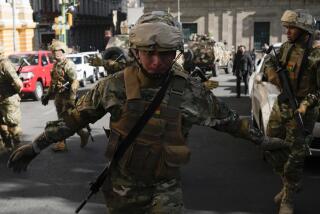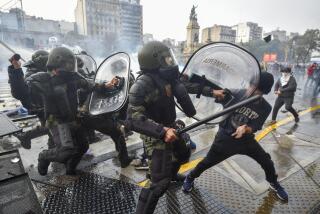Rebellion by Soldiers in Argentina Escalates : Growing Force of Mutineers Moves Closer to Capital
- Share via
BUENOS AIRES — A two-day-old army uprising escalated Saturday, belying the government’s claim to have crushed it, and Argentine officials spoke openly for the first time of a nascent coup attempt.
Hundreds of rebels, led by a Falklands War veteran demanding amnesty for human rights abuses and other crimes by the military, moved from a huge army base to a munitions base closer to the center of Buenos Aires. The mutineers broke out of their first base and traveled in a convoy of trucks and tanks through main streets, unhindered by loyalist forces.
Two more army units later joined the uprising. While the vast majority of the nation’s troops remained loyal, it was widely acknowledged that the uprising represented the most serious challenge to democratic rule in Argentina since the end of seven years of military dictatorship in December, 1983.
Alfonsin Issues Order
President Raul Alfonsin, who returned from a visit to the United States earlier in the day, told the nation Saturday night: “I have given orders to suffocate the insurrection.
“The citizenry is living through hours of tension because it realizes, correctly, that these attempts, however minuscule, minority and absurd, conspire against the collective attempt to guarantee togetherness, tolerance and liberty,” Alfonsin said.
However, by midnight, there was no indication when or how the government would move against the rebellion, leading to speculation that questions remained whether loyalist forces would follow orders to move against their fellow soldiers.
The only physical opposition to the rebels during the day came from neighborhood residents who jeered and threw rocks at those guarding the gates of the revolt’s new stronghold. The rebels answered with tear gas to drive back the protesters, news reports said, and fired shots in the air from automatic weapons.
Several thousand people responded to an impromptu appeal for the public to gather at the Congress building Saturday night to demonstrate support for democracy, restored in 1983 after military juntas had ruled since 1976. The rally went on well into the early morning hours with protesters banging drums and raising banners to protest an amnesty for military men found guilty of human rights crimes.
“Don’t let them rob our future” and “Don’t let the terror return,” declared messages superimposed over live television coverage of the third uprising against Alfonsin’s government by elements of the army in the last 19 months.
Smaller rallies took place in other cities across the country.
Machine Guns Set Up
Loyalist troops set up machine-gun emplacements at the Casa Rosada, Argentina’s White House, in the Plaza de Mayo, and sharpshooters were poised in windows and on the roof. Police units were deployed to guard radio and television stations.
On Friday, army units loyal to the government engaged the more than 400 rebels in two clashes at sprawling Campo de Mayo, the nation’s main army base 20 miles northwest of Buenos Aires. Officials said four soldiers were wounded, but they retracted an earlier statement that one officer had been killed.
Late Friday night, Vice President Victor Martinez said the mutiny had been suppressed. But the mutineers remained in control of the army infantry school at the base during the night and broke out of the camp Saturday afternoon.
Their faces smeared with black greasepaint, a traditional sign of rebellion, they sped to the Villa Martelli munitions base, located near a busy ring road about halfway between Campo de Mayo and downtown Buenos Aires.
There they were joined by two units based at the facility, the 3rd Arsenal Battalion and the 101st Logistical Battalion.
About 100 residents of the area jeered the rebels, and some threw rocks at the men in camouflage uniforms guarding the gate. After the guard unit fired shots into the air to frighten the demonstrators, police moved the crowd back, according to local news reports.
There was no explanation why the loyalist forces who had controlled all the access roads to Campo de Mayo, a huge installation covering 17 square miles, made no attempt to halt the rebels when they made their getaway.
The charismatic leader of the rebellion, Col. Mohamed Ali Seineldin, declared late Saturday night that Argentina’s democratic institutions “are not in danger.” In his first public statement of the day, he told radio reporters invited into the rebel base that “the movement lacks a political motive and has been initiated for military causes.”
Previously, he had said his goal was amnesty for officers convicted of human rights abuses during the previous military government’s campaign against subversion, in which at least 9,000 people “disappeared” and were presumed killed.
Seineldin, who served in the Falklands War in which Britain defeated Argentina in 1982, also sought pardons for three top armed forces officers convicted for their mishandling of the war. Furthermore, he demanded the release of the leaders of the two earlier uprisings, which occurred in April, 1987, and January, 1988.
Alfonsin had ended those two rebellions by conceding that middle and junior officers would not be tried for human rights abuses on grounds that they were following orders. However, his army commander, Gen. Jose Dante Caridi, began a purge of those officers who took part in the revolts or supported them, and Seineldin, until recently Argentina’s military attache to Panama, was denied promotion to general last month because of his ties to the rebels.
Alfonsin Rejects Talks
This time, Alfonsin vowed that he would neither negotiate with those who revolted nor make any concessions to them. He added, “I want to assure you that the seditious attempt does not endanger the institutions of the republic, nor the authority that emanates from the popular will.”
Gen. Caridi said in a statement Saturday night that the rebels demanded his resignation and the appointment of a successor named by the mutineers, among other “unacceptable conditions.” Caridi suggested that such demands contradicted those expressed by Seineldin himself in discussions with Caridi on Friday.
“This implies that Col. Seineldin has lost control of his subordinates,” Caridi said.
Foreign ambassadors, including the U.S. envoy, Theodore E. Gildred, were invited to attend a rare joint session Saturday of the Argentine Congress.
Earlier, the U.S. Embassy issued a statement on behalf of President Reagan and President-elect George Bush conveying their “firm and unwavering support” for Argentine democracy. Alfonsin had met Friday with Bush in Washington.
While the Congress met, thousands rallied outside in a somber gathering on a humid but clear night.
“These revolts are like a ladder, escalating each time--the rebels make more demands, and win more each time,” said Javier Gonzalez, 40, who brought his family to the demonstration. “What is at stake is power--who is in control.”
Gonzalez said that fewer people had turned up for Saturday’s protest than during a similar rally during the first rebellion, partly because of the late hour but also “because the people are frustrated. Alfonsin has kept giving in.”
Jorge Stetson, 62, shared that view. “The government has to stop them now,” he said. “Alfonsin’s worst error was the due obedience law (limiting prosecutions). These fellows should have been imprisoned as killers.”
The previous military government had run up a huge foreign debt with little to show for it, Stetson said, and had terrorized the population.
“We are determined to defend our democracy,” he added, “even if we have to give our own lives.”
Despite Argentina’s grave economic crisis, opinion polls have shown no public support for a return to military rule. The armed forces were thoroughly discredited because of the Falklands debacle and the human rights abuses from 1976 to 1983.
The president ousted by the military in 1976, Maria Estela Peron, met with Alfonsin on Saturday afternoon to express her support for civilian rule. The widow of former President Juan D. Peron, she had recently returned to Argentina from Spain.
The Peronists, leading in opinion polls for the May, 1989, presidential election, joined Alfonsin’s ruling party, the Radical Civic Union, in condemning the rebellion, as did virtually every trade union and civic organization.
Juan Carlos Pugliese, the Radical president of the Chamber of Deputies, appealed to the public to be ready to help support democracy against “what is already a clear attempt at a coup d’etat. “
More to Read
Sign up for Essential California
The most important California stories and recommendations in your inbox every morning.
You may occasionally receive promotional content from the Los Angeles Times.










